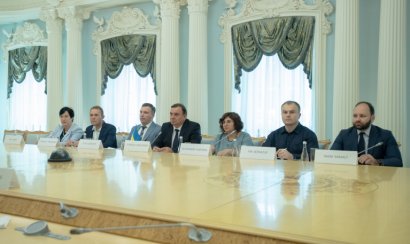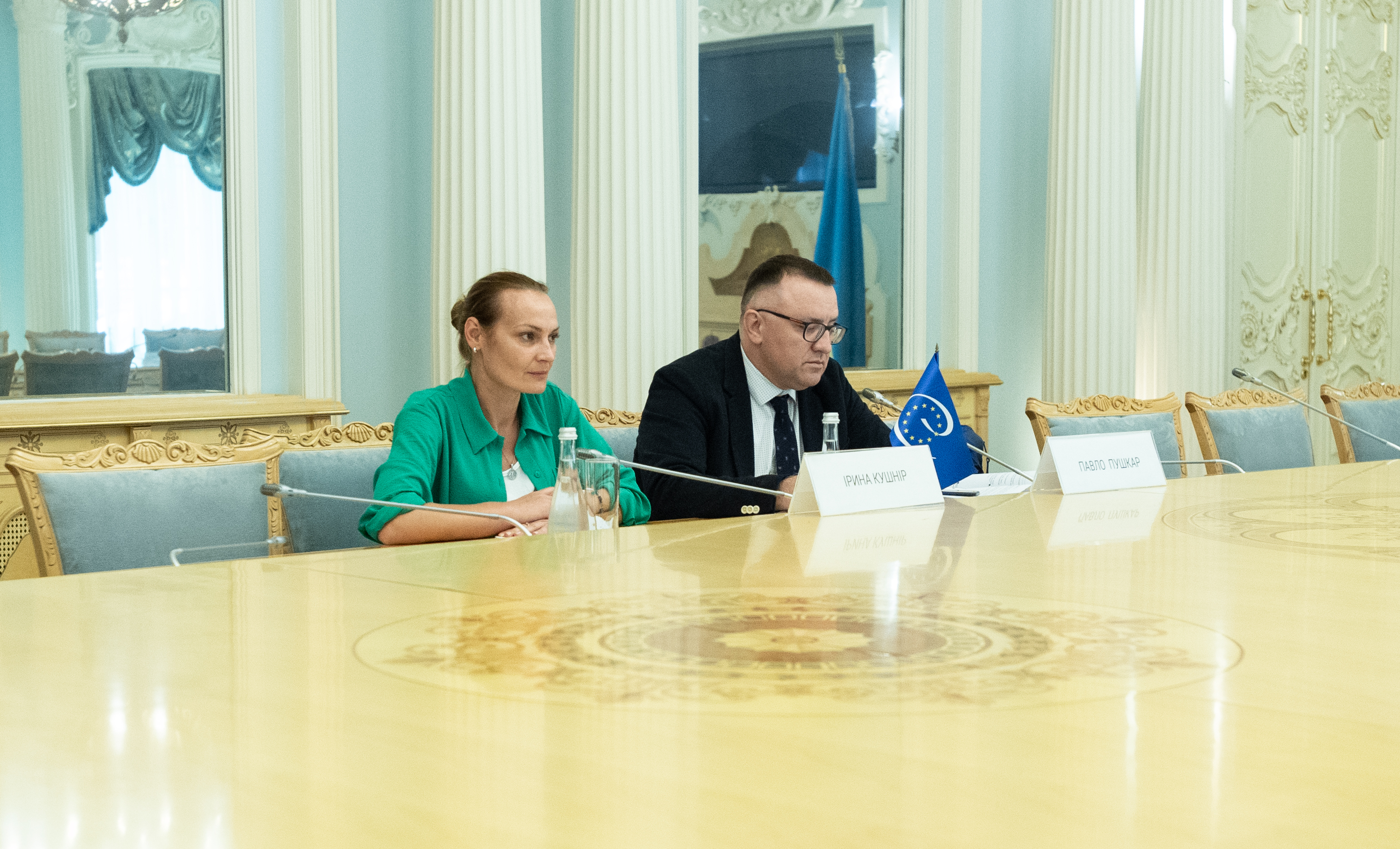Contact center of the Ukrainian Judiciary 044 207-35-46
ABOUT THE SUPREME COURT
FOR CITIZENS
ACTIVITY
PRESS-CENTER

The Supreme Court respects the judgments of the European Court of Human Rights and makes every effort to take measures to implement them. This applies to both individual and general measures.
This was stated by the President of the Supreme Court, Stanislav Kravchenko, during a working meeting with representatives of the Council of Europe.
The head of the Supreme Court focused on the fact that the main objective of criminal judges at present was to ensure compliance with conventional requirements during the pre-trial investigation of war crimes by exercising judicial control at this stage. After all, the better the work done to build an evidence base, the more realistic the prospect of bringing the perpetrators to justice.
Stanislav Kravchenko also analysed possible solutions to the systemic problems identified by the ECtHR in its judgments, expressing certain reservations about some of them. In particular, the excessive length of pre-trial investigation and trial, the application of preventive measures and the provision of adequate conditions of detention.
At the same time, according to the President of the Supreme Court, in addition to considering criminal proceedings for crimes committed by the Russian military, an equally pressing issue facing the courts of Ukraine is the protection of the social rights of citizens, both during the war and in the post-war period. This category of cases will obviously be one of the most numerous.
Stanislav Kravchenko stressed that the Supreme Court was well aware of the priorities of the judiciary in today's reality and assured that the Supreme Court was ready to continue actively developing cooperation with the Council of Europe.
Pavlo Pushkar, Head of the Division of the Department for the Execution of ECtHR Judgments of the Directorate General for Human Rights and the Rule of Law of the Council of Europe, noted that the Supreme Court remained a reliable institutional partner of the Council of Europe in the process of implementing ECtHR judgments and expressed gratitude to the Supreme Court for its fruitful professional cooperation.

He referred to the cases of Yuriy Mykolaiovych Ivanov v. Ukraine, Burmych and Others v. Ukraine, Sukachov v. Ukraine and Nevmerzhytskyi v. Ukraine, stressing the urgency of the problems outlined in the relevant ECtHR judgments. According to him, given the need to strike a balance between the measures to be taken, the requirements set out in the Court's judgments, and the situation in the country due to the war, Ukraine should make it clear to the Committee of Ministers of the Council of Europe that all these issues are under the control of the state authorities, set priorities in its work and outline the range of issues that need to be addressed in the current circumstances.
At the same time, Pavlo Pushkar noted that over the past year, despite the war, the Committee of Ministers of the Council of Europe stopped monitoring the implementation of about 60 decisions in cases against Ukraine, which has a positive impact on our country's European integration.
Vitalii Urkevych, the Secretary of the Grand Chamber of the Supreme Court, said that the problem of excessive delays in considering cases was largely caused by the occupation of part of Ukraine's territory and active hostilities in a number of settlements. For example, some of the judicial proceedings are taking place in the territories temporarily not controlled by Ukraine. There are also difficulties in keeping the parties informed of the progress of the proceedings.
Vitalii Urkevych highlighted concerns surrounding cases where the Russian Federation was the defendant, particularly in relation to questions concerning the judicial immunity of a foreign state.
Oleksandr Prokopenko, a judge of the Grand Chamber of the Supreme Court, outlined the problems that have arisen in the process of implementing ECtHR judgments in cases concerning judges, which are currently under the control of the Committee of Ministers of the Council of Europe, as well as pending before the Grand Chamber of the Supreme Court. The judge also focused on the category of cases related to the dismissal of civil servants under the Law of Ukraine "On Purification of Government", adopted in 2014, and the relevant case law of the ECtHR.
Yan Bernaziuk, a judge of the Administrative Cassation Court of the Supreme Court, provided information on the status of the enforcement of court decisions in the field of social rights protection. He stressed that after the end of the war, the payment of social benefits could become one of the biggest challenges for the state, as, according to the Pension Fund of Ukraine, some 450,000 court decisions in this category of cases are yet to be enforced. In addition, disputes over compensation for non-execution of court decisions by the Pension Fund of Ukraine and cases brought by heirs to obtain funds that belonged to testators but were not paid to them during their lifetime have recently become widespread.
Oleksandra Yanovska, a judge of the Criminal Cassation Court of the Supreme Court, stressed that both the legislative and judicial branches of power were responding appropriately to the urgent challenges posed by Russia's large-scale military aggression and that despite the extremely difficult conditions, Ukraine was still managing to solve problems that had been accumulating for years. It is due to the fact that our state has consistently followed the path of taking into account and applying the ECtHR case law that many issues have already been resolved at the legislative level.
According to her, the excessive length of proceedings is due in part to the lack of judges and courts - a significant number of these institutions are not functioning due to the occupation of the settlements in which they are located, active hostilities and the lack of adequate material and technical facilities. Oleksandra Yanovska believes that the excessive length of court proceedings can be prevented by amendments to the Criminal Procedure Code of Ukraine, which will give prosecutors the right to perform functions that investigating judges cannot perform for objective reasons, and by the introduction of remote justice, including the holding of court hearings by videoconference.
In the context of the discussion on the problem of non-execution of court decisions, Rasim Babanly, First Deputy Chief of Staff of the Supreme Court, reported on three constitutional petitions filed by the Supreme Court with the Constitutional Court of Ukraine concerning moratoria on the execution of court decisions, as this is one of the issues being monitored in the context of the implementation of the ECtHR judgment in Burmych and Others v. Ukraine. The speaker also drew attention to possible legislative changes that could improve the state of judicial control over the enforcement of court decisions.